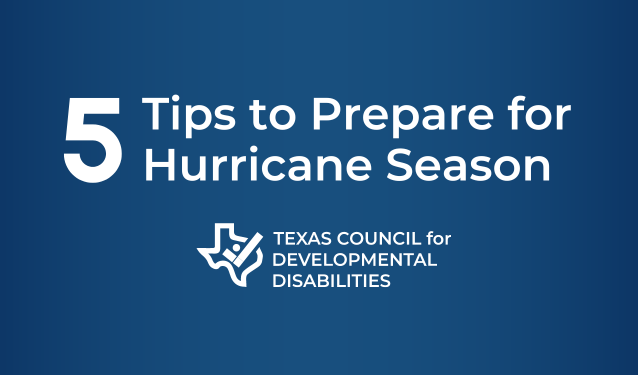


Guest Article by Crystal Goodwin
TCDD Public Health & Disability Integration Specialist
In Texas, June 1 marked the beginning of the hurricane season, which continues until Nov. 30. The National Oceanic and Atmospheric Administration (NOAA) predicts there will be 17-25 named hurricanes this year, including four to seven that are rated Category 3 or higher. Texas will see a 54% chance of a hurricane this year, and a 25% chance for a hurricane rated Category 3 or higher, according to NOAA.
A named hurricane maintains wind speeds of at least 39 miles per hour. Category 3 hurricanes maintain wind speeds of at least 111 miles per hour. Weather experts consider hurricanes rated Category 3 and higher to be major storms.
Personal preparedness is the first line of defense for both hurricane season and other disasters that might occur across the state. Always make sure to follow basic preparedness guidelines such as keeping extra food, water, and medication. You can find more information on the Texas Ready Disaster Supply Checklist.
People with disabilities often need to take extra steps to prepare for a disaster. To help, here are five things to consider during hurricane season and for other disaster preparedness.
Understand Your Rights
Know that even during evacuation and disaster sheltering, you still have the right to disability accommodations. You can ask for reasonable modifications to any policy or practice. If the Federal Emergency Management Agency (FEMA) fails to accommodate your disability, you can contact FEMA’s Office of Equal Rights at 1-202-212-3535 or visit the FEMA website.
Sign Up for Local Emergency Alerts
You can often find where to sign up on your county’s website. You can also sign up for alternatively formatted emergency alerts that are accessible to you and your family.
Find Your Local Assistance Program
Before a disaster strikes, check with local government agencies, nonprofit organizations, and people in your community to find out about assistance programs. Many areas have their own disaster assistance programs that might be able to provide help faster than federal programs, which might have longer wait times.
Customize Your Emergency Kit
Consider adding additional items to your emergency kit in case of evacuation. Think about adding things such as noise-canceling headphones, sensory items, comfort snacks, or communication cards.
Prepare Power-Dependent Equipment
If you have power-dependent medical equipment, talk with your health care provider about ways to keep your equipment running without power. You might also want to ask your power provider if you can be placed on a power priority list for power restoration. Find more information from the Texas Governor’s Committee on People with Disabilities.
To learn more about emergency preparedness and find tools to create your own crisis-response plan, check out our Emergency Preparedness resources.
